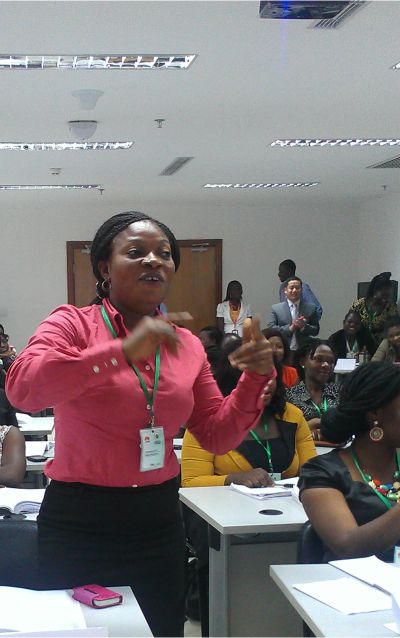Violence against women and girls is one of the most prevalent human rights violations in the world. It knows no social, economic or national boundaries. Worldwide, an estimated one in three women will experience physical or sexual abuse in her lifetime.
Gender-based violence undermines the health, dignity, security and autonomy of its victims, yet it remains shrouded in a culture of silence. Victims of violence can suffer sexual and reproductive health consequences, including forced and unwanted pregnancies, unsafe abortions, traumatic fistula, sexually transmitted infections including HIV, and even death.
It doesn't have to be this way. Women and men from all walks of life are joining together to help bring an end to these pervasive, and often deadly, acts of violence.
GBV Campaign
16 Days of Activism Against
16 Days of Activism Against
Gender-Based Violence Campaign
16 Days of Activism Against Gender-Based Violence Campaign – an international campaign originating from the first Women's Global Leadership Institute coordinated by the Center for Women's Global Leadership in 1991. Participants chose the dates of November 25 ~ International Day Against Violence Against Women ~ and December 10 ~ International Human Rights Day ~ in order to symbolically link violence against women and human rights and to emphasize that such violence is a violation of human rights.
Events
Upcoming YCW Workshops
Children Workshop
Children Workshop is an event where the issue of Child Safety is discussed whether online or offline. As guided by a dedicated Chaperon, children discuss the issue of child abuse and safety in their schools and communities.
Join Next Workshop
Parents Orientation
We have huge responsibility as parents and responsible citizens to safeguard children and to educate them necessary skills needed to be safe. At YCW Nigeria, we designed a session where we interact with parents on Child Safety.
Register to Participate
Annual Conference
We gathered children and teenagers together annually to discuss solutions to child abuse and encourage them to be voices in their schools and communities against abuses and violence. Children are our speakers during this event.
Register to Participate
Gallery
Past Events
WE ARE A LEADING CRIME PREVENTION AND PUBLIC SAFETY ORGANIZATION IN NIGERIA
Always at the forefront of
Crime Prevention, Education and Safety (Online/Offline)
GBV
Gender-Based Violence Prevention
-
Preventing GBVPreventing GBV, to stop it from happening in the first place, is a key priority. Given that GBV is based on gender norms and gender-based power inequalities, GBV prevention strategies are intrinsically linked to efforts to increase gender equality more generally. Hence, rather than disconnecting and treating GBV as a separate and isolated problem, it has to be situated in the context of gender inequalities.
-
A shift in focusA shift in focus from seeing women (and other groups exposed to genderbased violence) as victims to seeing them as survivors, actors and agents of change with a strong focus on women and girls’ empowerment and agency
-
Increase women’s political participation and influenceEfforts to increase women’s political participation and influence in contexts of peace, conflicts and other humanitarian crisis. Women have rights to participate on equal terms with men in political bodies at all levels of the society, including in peace processes. In many countries women’s political representation is very low, and women are often excluded from formal peace negotiations. This has evastating consequences for the possibility to reach a sustainable development, peace and human security
-
Efforts to increase women’s economic empowermentEfforts to increase women’s economic empowerment that enhance women’s bargaining power and ability to leave abusive relationships. This includes strengthening women’s entrepreneurship and employment opportunities, improving women’s access to land and property rights, promoting equal sharing of unpaid care work between women and men and encouraging universal access to quality education. While such efforts can contribute to increased violence against women in the short term due to gender ideals linking masculinity to the provider role, increasing women’s economic empowerment is still crucial for longer term prevention of GBV. Women’s economic empowerment interventions which also address gender norms and reach couples and communities can reduce such risks.Efforts to increase sexual and reproductive healthEfforts to increase sexual and reproductive health and rights are crucial for preventing GBV given the close relationship between the two. Such efforts include promotion and protection of women’s right to have control and decide freely over matters related to their sexuality, including sexual and reproductive health, family-planning possibilities and HIV/Aids prevention.Incorporate men and boysIncorporate men and boys as perpetrators, as victims/survivors and as agents of change. Men and boys are often neglected as survivors of GBV. Hence, there is a need to recognise and address men’s and boys’ particular vulnerabilities and needs in relation to GBV.

















